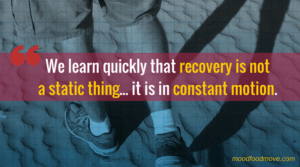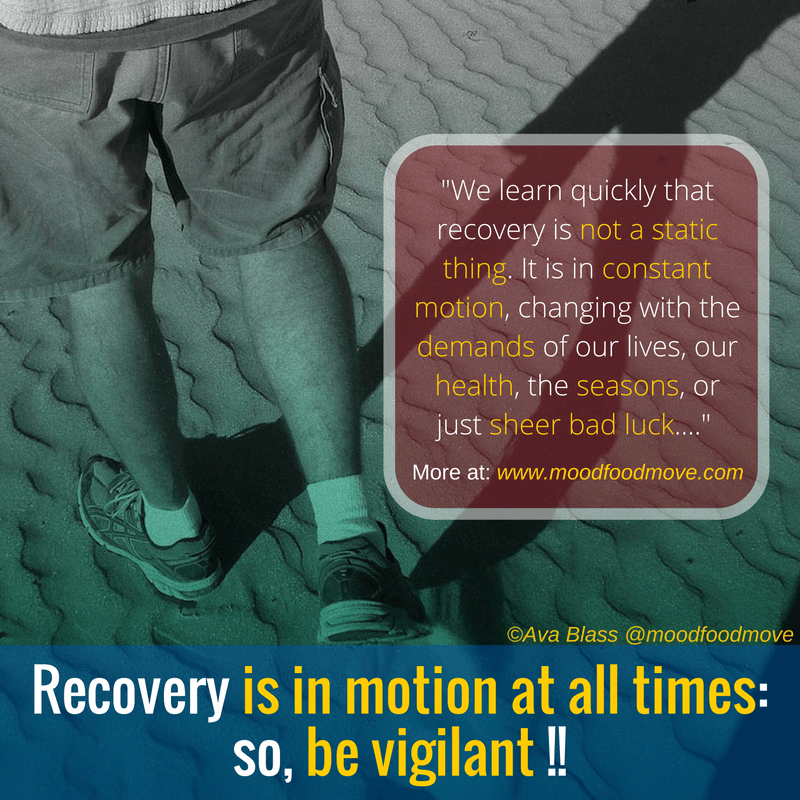 All of us in recovery quickly learn that recovery is not static, it is in constant motion and forever changing. Sometimes the reasons are frivolous – and other times it’s substantial personal challenges which derail us from recovery. Very early on it becomes clear that to have any chance of a stable recovery we need an arsenal of contingencies. And we need to remain vigilant.*
All of us in recovery quickly learn that recovery is not static, it is in constant motion and forever changing. Sometimes the reasons are frivolous – and other times it’s substantial personal challenges which derail us from recovery. Very early on it becomes clear that to have any chance of a stable recovery we need an arsenal of contingencies. And we need to remain vigilant.*
Our first mistake is to coast
Of course we’ll make mistakes as we build our own unique recovery path. A mistake most of us will make – that leads to relapse – is that we start coasting. We fail to prioritize recovery, and we let slide the habits and routines that keep us safe. Life subsequently creeps in as a higher priority and so we become complacent. Our downfall comes when life gets in the way, or our bodies betray us, or stress arises from unexpected sources. Before we know it we are flailing, and teetering on the edge of relapse. We could have avoided all this if we’d been vigilant.
Recovery is sustainable though. It comes through self-knowledge… working our recovery, learning what our triggers and our times of risk are. It also comes through having contingencies that we can turn to when it’s raining, or our sponsor isn’t around, or we’ve run out of vegetables, or we’re going through a period of insomnia, or we get ill or injured. To implement contingencies we need to notice when things start to slip, or begin to get tough. This is vigilance I am referring to: noticing when and how things are changing.
The price of freedom is eternal vigilance.
We need to discover for ourselves what works, because we don’t all take the same route through recovery. Self-knowledge comes from actively being in recovery and noticing triggers and risks: those times and situations when discomfort arises. It comes from learning what your body needs in order to be healthy: how much sleep and exercise, and what foods or supplements work best for you. It also comes from knowing your mind: what helps you to relax, and to be in a positive mindset.
That’s why relapse and failure and white-knuckling and sober-drunks happen. Because ultimately it is for you to learn what your recovery needs are, and how to ensure that they are met.
It’s not easy to remain vigilant. I’ll give you an example from my own life, when I almost derailed from my depression recovery. As part of my depression management I eat well, take supplements, exercise daily, get sufficient sleep, maintain relationships, and manage my stress. However, my mood recently began to crumble, and I was at risk. Why? Because Winter had set in – therefore I was missing daily runs due to the rain, and I was indoors a lot more.
As a result of this I got a dose of SAD, with the symptoms being longer sleep hours, less energy, carbohydrate cravings, and a significant dip in my mood. Once I worked out was going on I took action. I started vitamin D3 supplements, I resumed exercising outside, I took daily midday walks, and I read in front of a light box in the morning. Within a week my mood had improved. As a result of the experience I now know how to adapt my recovery needs seasonally.
Recovery never gets easy, but it does get easier
Recovery will never be easy, but it does get easier. The ‘easier’ part comes about by knowing our recovery needs, and creating contingencies to fall back on. When we are stable in our recovery we maintain it through light management, but we are never just coasting. We remain vigilant for when things change, and we diagnose why they changed. Our recovery becomes more stable, more solid, and more yielding when we understand the hows and whys of our unique recovery. And that’s how it becomes easier.
Personally, as I got to understand my own recovery needs I found it a relief to learn that my struggles and relapses don’t just randomly happen. As demonstrated by my SAD example above, problems occur for a reason. A relapse is the end point in a sequence, where something is out of alignment or has been omitted. It culminates in a collapse. If we are vigilant and make the small adjustments needed when we notice something out of sync, we can avoid it spinning off into a relapse. This how our vigilance pays dividends.
We have to keep maintaining ourselves in our recovery program, otherwise we don’t succeed. Maintain the vigilance, maintain the adjustments and contingencies, and keep learning about your recovery needs. And don’t forget that recovery is not static , it is in constant motion.
I’ll end this article with a quote I like from Rich Roll:
Recovery is primarily a growth opportunity. You are either moving towards recovery, or greater recovery, or growth. Or you are regressing and moving towards relapse, or your life is devolving. I have to push myself to continually expand and grow.
Take good care of yourself,
Ava 🙂
*This article was written when moodfoodmove’s focus was people affected by depression and addiction. Whilst we very much still care about this group, our advice re taking better care of yourself (via good nutrition, healthy lifestyle and a positive mindset) applies equally to all of us. We ALL need to take better care of ourselves.

